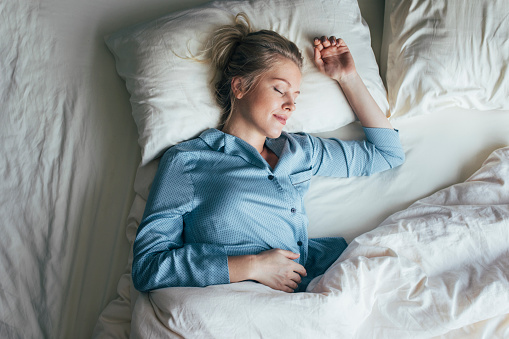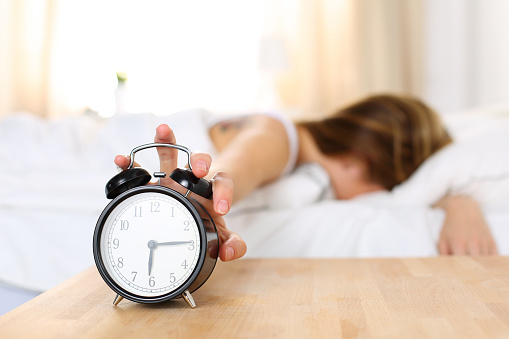There are several justifications for taking a nap during the day, including working shifts or having chronic health issues. If possible, avoid sleeping for long stretches of time during the day. Shorter daytime naps are OK as long as they don’t affect the quantity and quality of nighttime naps.
By dissecting the key aspects and problems involved, we’ll answer the question “Is sleeping during the day instead of night, bad?” in this article. Things include why humans have historically been conditioned to sleep at night, the benefits of daytime sleep, how it may affect your health overall, and strategies for maximizing daytime sleep if you have no other option.
Sleep and your biological clock
Let’s start with the science of why getting sleep at night has traditionally been recommended. Our bodies contain a biological clock that controls both our mood and our sleep cycle. Are we tired and prepared for bed? Are we awake and well-rested?
Your sleep cycle is regulated by an internal body clock, which also decides whether you feel alert and fresh or exhausted and ready for bed.
Our circadian rhythm, or body clock’s 24-hour cycle, controls when we get up, when it’s time to go to sleep, and how gradually, but steadily we become fatigued in between. What Makes You Tick: Circadian Rhythms, published by the University of Oxford, provides a brief and accessible explanation of this natural phenomena and its significance to our daily lives.
The other component that affects when we feel more sleepy naturally is light. The sun provides good ol’ natural light; do you see where this is going?
The brain receives a signal when our eyes are exposed to natural (or artificial) light, indicating whether it is day or night. Our bodies release the hormone melatonin as the day grows darker, which makes us tired.
Similar to how our bodies release cortisol as the day grows lighter to assist us stay alert and increase our energy levels. The short version of this long explanation is that our bodies are designed to sleep at night. So why do people still sleep during the day if science tells us it’s not natural?
Arguments for Daytime Sleeping
There are several reasons why someone could want to sleep throughout the day. It might be a little snooze to make up for a sleepless night, or it might be a crucial stretch of 6 to 8 hours for a shift worker on the graveyard roster.
In other circumstances, chronic daytime sleepiness might be brought on by a number of medical issues that need to be treated by a doctor. Let’s examine each one in more detail on its own.
General Weakness
You don’t have to be an expert in sleep to understand that you’ll probably feel more exhausted the less sleep you receive. As we previously stated, its basic biology that causes a person’s sleep requirements to vary over the course of their lifespan. But on average, 7-9 hours are what are needed.
According to research, approximately 30% of Americans sleep for less than six hours each night. That can make taking a snooze in the afternoon attractive.
Timing and duration are crucial in this situation to avoid having a detrimental impact on your ability to sleep at night. For the most immediate feeling of alertness and the least amount of post-nap sluggishness, experts advise keeping your nap to 30 minutes or less.
An afternoon nap of 10 minutes has been demonstrated to have a number of immediate benefits, such as improved energy and cognitive function. A 10-minute snooze has advantages that can extend for up to 155 minutes.
A Shift Job
According to the Bureau of Labor Statistics, 15 million Americans either work a permanent night shift or alternate working nights. That’s a sizable portion of the population who are more likely to experience chronic fatigue, memory loss, and other physical and mental health problems.
For these people, a good night’s sleep during the day is very important. In fact, the Cleveland Clinic advises against “Shift Work Sleep Disorder,” which is defined by:
- extreme drowsiness
- mental haze
- difficulty concentrating
- Moodiness
- Headaches (this video may help decrease the pounding pain in your head) (this video may help reduce the throbbing pain in your head)
- Health Conditions
Excessive Daytime Sleepiness, or EDS, is described by the American Sleep Association as “feeling an elevated pressure to fall asleep during typical wake hours.” It’s often referred to as “hypersomnia,” and it’s typically a sign of a bigger problem.
The following illnesses are among those that may cause excessive daytime sleepiness, according to the Mayo Clinic.
You struggle to get asleep or stay asleep all night if you have insomnia.
You have abnormal breathing patterns when you are asleep if you have sleep apnea. Sleep apnea can take many different forms. Can Working Night Shift Cause Sleep Apnea? (Continue reading)
Extreme daytime sleepiness and unplanned sleep during the day are symptoms of the condition narcolepsy.
The Sleep Foundation claims that people with mental health issues such depression, bipolar disorder, generalized anxiety disorder, or post-traumatic stress disorder may also feel extremely exhausted during the day.
Are you wondering if your sleeping patterns may cause you concern? The Epworth Drowsiness Scale, which is used to gauge daytime sleepiness, is available at this URL. The more points received (more specifically, 10 or more), the greater the likelihood that an underlying ailment may be causing the severe weariness. This can be a useful tool, but it’s always preferable to contact a doctor if you think something could be wrong.
Effects of Daytime Sleep on the Body and Mind
We now know that people tend to sleep more soundly at night because of the way their bodies are wired, and we’ve also explored some of the various reasons why people would do so. We’ll now examine the benefits and drawbacks of daytime sleep in more detail.
Furthermore, we’ll start with the detrimental impacts on the body and psyche because we prefer to leave things strong. Unfortunately, there are far more potential side effects of daytime sleep than there are benefits, but it really depends on your personal needs and way of life.
For instance, shift workers frequently are forced to sleep through the day for extended periods of time. It is a habit that interferes with the circadian cycle and internal body clock and may cause problems with memory, difficulty concentrating, headaches, and excessive daytime weariness.
For shift workers, fatigue and lack of concentration might raise their chance of suffering from serious health and safety issues, such as:
- Accidents
- error-making at work
- Injuries
- Heart condition
- Insulin resistance, which ups the chance of developing diabetes
- Depression
abuse of drugs and alcohol
Daytime sleep usually takes the shape of a nap for folks who don’t work shifts or have an underlying medical condition. As previously said, the duration and time of the nap will determine whether it has a positive or negative effect. Avoid letting that midday nap affect how well you sleep at night.
“A nap of less than 30 minutes duration during the day improves wakefulness and enhances performance and learning ability,” according to a study published in the National Library of Medicine. On the other hand, frequent and prolonged napping may be linked to greater morbidity and death, particularly in the elderly. Basically, if you nap too long, you might feel drowsy and exhausted the remainder of the day.
The timing of a nap is also essential to its efficacy. To avoid disturbing nocturnal sleep, the Mayo Clinic advises taking a nap before 3:00 pm. The last thing you want to do is fall asleep too late in the day, struggle to sleep at night, and then wake up feeling too exhausted and needing another nap. a cycle you should avoid engaging in.
- Relaxation
- decreased tiredness
- heightened awareness
- better mood
enhanced performance, including greater memory and quicker reaction times
Some people find that the calm nocturnal hours are more productive and prefer to work during this time. Once more, a lot of this depends on personal preference and what suits each person differently.
Increased Daytime Sleep
There are strategies to optimize the possible advantages and limit the potential drawbacks for those who are forced to sleep during the day. Even while combating biological and environmental circumstances, some self-reflection and planning can go a long way in ensuring you are as well rested as possible.






